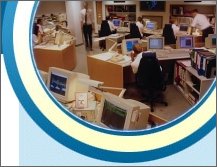Workplace Privacy? Here is Why You Now Have NONE
by www.SixWise.com
If you think that closing your office door or working in
an isolated cubicle means no one knows what you're up to at
work, think again. Employers have begun monitoring everything
from computer keystrokes to e-mails -- even those that have
been deleted -- to phone conversations, and the end result
is zero privacy at work for you.
In defense of the employers, more than 70 percent of adults
have accessed the Internet for personal use while at work,
and it's likely that an even greater number have made personal
phone calls. And that results in a loss of productivity to
the company.
|

It may not be this obvious ... but rest assured,
someone is watching you at work.
|
But that's not the only reason that, according to the 2005
Electronic Monitoring and Surveillance Survey, 76 percent
of employers monitor their employees' Web connections and
50 percent store and monitor their workers' computer files.
Legal liability issues (an e-mail can be used as evidence
against a company) and security breaches are also reasons
for monitoring.
But, according to some human rights advocates, monitoring
every move that workers make could be a violation of the basic
principle of privacy.
"Privacy is one of the most-violated principles in the
American workplace. People are aware to a degree how much
monitoring goes on in the workplace, but most individuals
are unaware of how pervasive the lack of privacy is,"
said Jeremy Gruber, legal director of the National Workrights
Institute, an advocacy group for human rights in the workplace.
At Your Computer
Employers have a free reign when it comes to electronic surveillance,
as there are very few laws that address the issue, particularly
in the private sector. Since the computer belongs to the employer,
they have the right to monitor it. This can entail monitoring:
-
What's on the screen or stored in the hard drive (including
personal computer files).
-
Internet use (Web pages visited, downloads).
-
E-mails (even those that are deleted may be stored
on the computer).
-
Instant messages.
-
Keystrokes per hour.
-
Amount of time a computer terminal is left idle.
How likely is it that a worker could be fired for surfing
the Web or sending personal e-mails at work? The Electronic
Monitoring Survey found that 26 percent of employers have
fired workers for Internet-related offenses, and 25 percent
have let workers go for e-mail-related offenses.
Most of the time, employers conduct such monitoring without
letting the employee know--until a performance evaluation
comes up or a problem is found.
Among the most invasive of computer monitoring is when employers
monitor workers' keystrokes per hour to see how fast they
are typing. This has been linked to health problems including
stress disabilities and carpal tunnel syndrome.
"There is a problem with worker monitoring when it leads
to an oppressive work environment. That can happen when employers
can monitor things like keystrokes," says Jay Stanley,
communications director for the American Civil Liberties Union
Technology and Liberty Project.
On the Phone
Employers can monitor and tape calls with clients or customers
for quality control purposes, and, if workers have been told
not to make personal calls from work, personal calls may also
be monitored.
And that's not all. Employers can obtain a list of telephone
numbers dialed from your extension, along with the length
of each call. According to the surveillance survey, 51 percent
of employers monitored these items. Other phone surveillances
include:
|

Hidden cameras can monitor you in the office, locker
room--even in the restroom.
|
In the Office
Your employer can also monitor what goes on in the office
by using hidden video cameras. They do this to prevent theft,
violence or other criminal behaviors. The cameras can be anywhere,
including offices, hallways, locker rooms -- even restrooms.
Some 51 percent of employers use such technology.
On You
Certain workplaces, particularly those in health care settings,
have begun placing electronic monitors directly on employees.
Such is the case for pediatric nurses at the University of
California-San Francisco Medical Center. The monitors record
every room the nurse visits, along with how long is spent
in each room.
While some say the devices help improve care, for instance
being able to locate nurses immediately when they're needed
for an emergency, others say it's a violation of privacy.
"These badges are worn every place they go," says
Christine Terranova of the New York State Nurses Association.
"If they take their break, if they go to the bathroom,
it reads out on a computer-generated real-time screen and
it's logged."
And, she says, it may actually hinder patient care. "[Patients
are] crying cause they just found out they have cancer, and
I can't stop for five minutes and hold their hand because
I know the schematic is going to say that I spent 35 minutes
there instead of five," she says.
Other Surveillance
Other types of surveillance include random drug testing,
which can be legally conducted even if an employee is not
suspected of using drugs, and satellite surveillance.
Satellite technology allows employers to track cell phones,
company cars, trucks, pagers and more to be sure they're being
used for their intended work-related purposes.
For instance, snowplows and sweepers in Aurora, Colorado
have been installed with this type of tracking device, and,
says Lynn Center, a supervisor and project engineer, "We
have seen an overall increase in productivity for our units,
about 15 percent, just by having the units in the vehicles."
The debate is likely to continue as to how far workplace
surveillance should go. On one end of the spectrum are those
who say it's not a problem as long as you're doing the right
thing.
"It's Big Brother. It's watching you, making sure you
do what you're supposed to do, but if you are doing what you're
supposed to be doing then you shouldn't have a problem,"
says Maria Coleman, a truck driver who is under constant surveillance.
And at the other end of the spectrum are those who think
too much surveillance may actually be counterproductive.
"It can stifle all kinds of activity," says Gruber.
"It can stifle union organizing, it can stifle whistle-blower
activity, not to mention the lack of privacy that employees
will have when they have absolutely no ability to have some
individual time for themselves."
Recommended Reading
12
Signs it is REALLY Time to Leave Your Job
The Emotionally
Hazardous Work Environment: Is it Worth the Price You Pay?
Sources
Workplace
Privacy? Forget It!
Workplace
Privacy and Employee Monitoring
The
National Workrights Institute
ABC
News: Every Step You Take
How
Workplace Surveillance Works